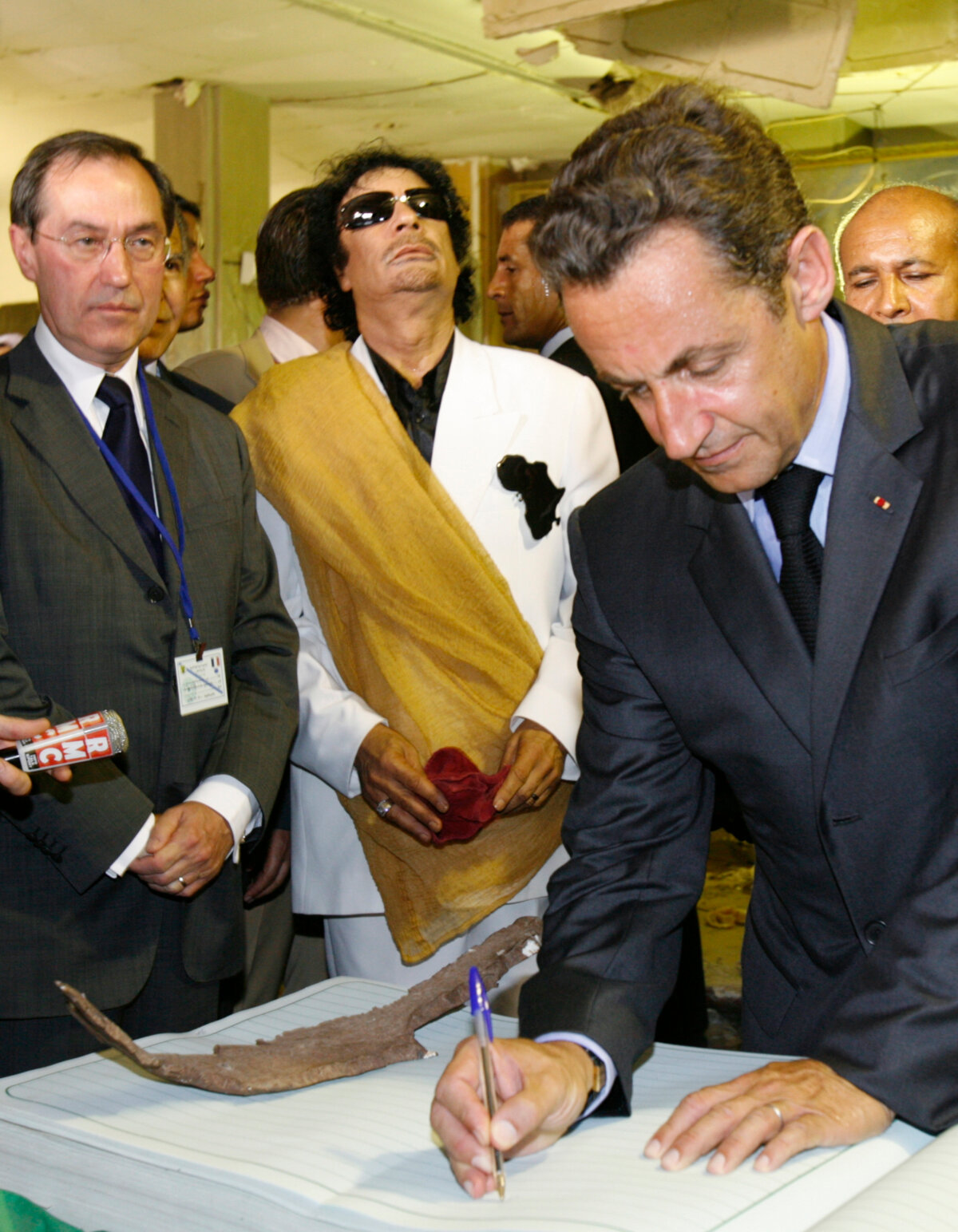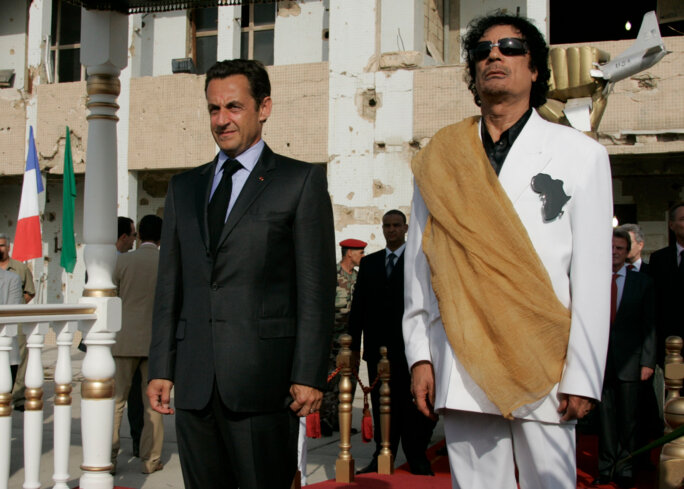Judges investigating the document published by Mediapart which shows that the Libyan authorities agreed to bankroll Nicolas Sarkozy's 2007 election campaign have begun to piece together how the saga began. Several witness have given evidence about Sarkozy's first official visit to the North African country in October 2005, when he was France's interior minister. According to arms dealer Ziad Takieddine, who was in Tripoli at the time, it was during a one-to-one meeting with Libyan leader Colonel Muammar Gaddafi during that trip that Sarkozy asked outright for financial support for his planned election campaign in 2007.
Both Takieddine and the former French ambassador to Libya Jean-Luc Sibiude have talked to the judges about this meeting in 2005, which took place with no officials present. Takieddine says that shortly after that encounter he was approached by Libya's security chief Abdullah Senussi and asked to work out the amount of financial help to give Sarkozy, following the latter's recent demand for help from Gaddafi. Once Takieddine had returned to Paris he met Sarkozy's right-hand man Claude Guéant to discuss the cost of financing a presidential campaign.

Enlargement : Illustration 1

During the course of the investigation the judges have also discovered that another close ally of Nicolas Sarkozy, Brice Hortefeux, went to Tripoli just three months after the interior minister’s visit, and secretly met with Abdullah Senussi, seen by many as a central figure in corrupt dealings between France and Libya. Hortefeux, who was France's local government minister at the time, did not inform the French diplomatic authorities about that meeting. It took place in the company of Takieddine who, having been involved in the covert financing of right-winger Édouard Balladur's presidential campaign in 1995, was now working as a kind of special envoy on behalf of the Sarkozy camp in several Arab countries.
Nicolas Sarkozy's official visit as interior minister to Libya on October 6th, 2005, has puzzled observers for some time. Though officially he went to discuss how to curb the waves of migrants coming into Europe via North Africa, the minister of the interior's stay did not even last 24 hours. His lightning trip had been preceded four days earlier by the visit of Guéant, then his chief of staff at the ministry.
A preliminary note written by Takieddine for Guéant's visit certainly raises suspicions. The note points out that the visit was “unusual” and had to be of a “secret character”. Takieddine's note added: “For this reason it will be preferable for CG [editor's note, Claude Guéant] to go alone and that the trip is carried out 'without fanfare'.” As for the aim of the visit, this was to make it “easier to discuss the other important issue, in the most direct manner...” According to travel receipts obtained by investigators, Ziad Takieddine did indeed go to Tripoli for Sarkozy's first visit there.
When he was questioned by judges on February 26th, 2014, about the first meeting between Sarkozy and Gaddafi, former ambassador Jean-Luc Sibiude said that after initial “broad” discussions– in other words, in the presence of several diplomats – Nicolas Sarkozy and Muammar Gaddafi had a lengthy one-to-one meeting. This was “perhaps double [the length] of the broad discussion” said the diplomat. “If I have indicated that the private discussion lasted a long time, it's because at the end of the discussion I said to the interpretor: 'They must have said quite a few things'. She had simply replied that she was bound by professional secrecy.”
The former ambassador also talked about Claude Guéant's visit a few days earlier, on October 1st, 2005, and his meeting with the Libyan interior minister on that occasion. “I know that he [editor's note, Claude Guéant] had other contacts which I didn't take part in; they must have taken place at the Corinthia Hotel where he was staying...The Corinthia Hotel is the only international class hotel in Tripoli, it's also the hotel where Monsieur Sarkozy stayed during his visit as interior minister in 2005 and as president in July 2007,” said Jean-Luc Sibiude.
Another member of the embassy staff, Jean-Guy Pérès, who was questioned by detectives from the gendarmerie on June 30th, 2014, also confirmed details of the Sarkozy-Gaddafi meeting. “Indeed, it's coming back to me, there could have been a moment at the end of the discussion when we were asked to leave the tent and when the two principal personages could have been alone together or with other people,” said Pérès, a retired police superintendent who was the security attaché at the French Embassy in Tripoli from 2005 to 2008.
Ziad Takieddine spoke about the secrets of this first and mysterious conversation between the two men when he was questioned on March 13th this year. The coordinator of Franco-Libyan rapprochement since the spring of 2005, Takieddine organised all the visits made by Sarkozy's entourage to Libya. The arms dealer first of all noted that on October 6th, 2005, Nicolas Sarkozy had insisted on visiting Gaddafi's house that had been destroyed by American air strikes in 1986. The interior minister had wanted to send a “strong signal to the Libyan leader” and “Gaddafi had much appreciated [it],” said Takieddine, who noted that a one-to-one meeting had been organised between the two men that day. “The visit then continued at the presidential palace where, at the end of the meeting, Messieurs Sarkozy and Gaddafi had a face-to-face discussion without an interpretor.”
Takieddine continued: “The same evening, at the hotel, I came to greet Monsieur Sarkozy before his departure, I was accompanied by Monsieur Senussi. We went up to Monsieur Sarkozy's suite and we sat in the lounge. Monsieur Guéant was also present. The object of this discussion was, in particular, Monsieur Senussi's [court] sentence in absentia. Monsieur Guéant made assurances on this issue on several occasions.” In 1999 Senussi, who is also Gaddafi's brother-in-law, was convicted by a French court for his role in the 1989 bombing of a DC-10 passenger plane, Union de Transports Aériens (UTA) flight 772, flying over Niger that resulted in the deaths of 170 people, 54 of them French. He was given a life sentence.
'Your friend asked the Leader for help in financing his campaign'
Mediapart has already published documents showing how Sarkozy's entourage did all they could during this period to enable Abdullah Senussi to escape the sanction of the French court. A month after Sarkozy's 2005 visit to Tripoli the minister's friend and later his personal lawyer Thierry Herzog was designated by Senussi to defend his interests in the DC-10 affair. The affair also led to numerous secret meetings in Paris.
Then, for the first time, Takieddine told the judges about the subject of the first discussions between Sarkozy and Gaddafi during their one-to-one meeting in October 2005. “At the end of that discussion, we had an evening debriefing about the visit at Monsieur Senussi's home. On this occasion Monsieur Senussi directly asked me what the cost was of a presidential campaign in France. I asked him why this question...and he answered me: 'Your friend asked the Leader for help in financing his campaign' and Monsieur Gaddafi wanted to know how much that might cost him.”

Enlargement : Illustration 2

The arms dealer and middleman said that on his return to Paris he met Claude Guéant to speak about it, “always at the same place, the Sofitel Hotel near the ministry of the interior”. Takieddine said: “This hotel has a little reception room with a bar and we always saw each other at this place... Monsieur Guéant replied to me the following way: 'Perhaps he might have asked for help but in any case not for campaign finance...he told me that Sarkozy was not yet a candidate and I insisted about the cost and Monsieur Guéant told me it was 22 million euros. I therefore returned to Libya several days later and I made clear to Monsieur Senussi the result of our conversation...Monsieur Senussi confirmed to me that there was a very clear request from Monsieur Sarkozy.”
Sarkozy's loyal ally Brice Hortefeux, junior minister for local government, went to Tripoli just under three months later. Former ambassador Jean-Luc Sibiude told the judges he was “surprised” by this visit, which took place on December 21st. According to the diplomat, the visit “didn't make much sense”.
Sibiude told the judges: “For my part, [this visit] surprised me, for on the one hand it seemed that Monsieur Sarkozy's visit was sufficient on its own, and in addition Monsieur Hotefeux' visit resulted in an agreement between the French and Libyan local authorities, which didn’t make much sense in the Libyan context, as these entities don’t exist in Libya. With hindsight it appeared to me that this agreement could have justified a visit that didn't make much sense.”
On the same trip Brice Hortefeux also met Abdullah Senussi, who was still under the sentence of the French court, without informing the French diplomatic authorities about it. Senussi is today being held in great secrecy in Libya where he faces the death penalty over war crime charges. The names Senussi and Hortefeux both appear in the document, dated 2006, that was revealed by Mediapart in April 2012 and which triggered the investigation into Libyan funding of Sarkozy's campaign.
The publication of the document followed a lengthy series of investigations by Mediapart into the dealings between Sarkozy and his close entourage with the Gaddafi regime during the preparations for his bid for the presidency. After publication of the document in April 2012, Sarkozy lodged a complaint against Mediapart for ‘forgery and use of forgery’. After a subsequent police investigation found no grounds for the complaint, Sarkozy last year lodged a lawsuit as a civil party against Mediapart, again for ‘forgery and use of forgery’ which, under French law, automatically triggered a judicial investigation. Meanwhile, the evidence suggesting that the former president’s 2007 election campaign was partly funded by Gaddafi is the subject of a judicial investigation led by judges Serge Tournaire and René Grouman.
When Hortefeux himself was questioned by the judges he admitted to the meeting with Senussi, which did not feature in his official diary. “Monsieur Takieddine was there before my arrival and he stayed after my departure, for how long I don't know” Hortefeux said. “I don't know the reasons for Ziad Takieddine's presence in Libya in this period, which was doubtless explained by the links that he had with the Libyan authorities at the time, as he had with the Saudi and Lebanese authorities.”
During his visit the French minister for local authorities had meetings with the Libyan branch of the French right-wing UMP party, then in power in France, and of which Hortefeux is a member. It was only in the evening, after an official dinner, that Brice Hortefeux met Abdullah Senussi. “At the end of the dinner,” said Hortefeux, “an official Libyan car drove me to a building where I then met Monsieur Senussi...on my arrival in this building Monsieur Senussi as well as Ziad Takieddine were there. The conversation was indirect because neither Monsieur Senussi nor me speak fluent English. It was thus an indirect conversation in the sense that Monsieur Senussi expressed himself in Arabic and the translation was done sometimes by an interpreter, sometimes by Monsieur Takieddine.”
As for the content of the conversation itself, Brice Hortefeux remained very cryptic. He spoke of a conversation that “lasted 10 or 15 minutes” on the issue of the flow of migrants in a total discussion that “lasted around 40 minutes”. What about the other 30 minutes? “I state that neither with Monsieur Senussi nor with any of the Libyans I spoke with were there any commercial negotiations for which, given my ministerial remit, I was not in fact competent [to discuss],” said Hortefeux.
Former ambassador Jean-Luc Sibiude had himself told the judges that in relations between the French ministry of the interior and Libya there were essentially three main issues. “The control of flows of migrants, the fight against terrorism and, unofficially, but Monsieur Guéant had told me about it, the personal situation of Monsieur Senussi who had been sentenced in absentia in France but who was above all the object of an arrest warrant from Interpol,” said the diplomat. “And thus, in the course of unofficial discussions, the Libyans were asking their interlocutors at the French ministry of the interior what they could do to alter the situation in a favourable way...for me, the fact that Monsieur Hortefeux was received by Monsieur Senussi, which I was unaware of, is probably not unconnected with these Libyan demands, for me it is likely that this issue was tackled during the discussion whose existence I was unaware of.”
Senussi, who was handed over to the Libyans by the authorities in Mauritania, where he had taken refuge in the months after the fall of the Gaddafi regime in 2011, remains a key witness in the Libyan funding affair. During a press conference that was filmed on August 21st, 2011, Senussi said in relation to Nicolas Sarkozy: “He agreed to work with the Libyans and we helped him to become president of France by financing his campaign. Several documents prove that we financed him. When he came to Libya Sarkozy also told the Leader that he would work hard to get [me] out of the DC-10 UTA case.”
--------------------------------------------------------------
- The French version of this story can be found here.
English version by Michael Streeter



